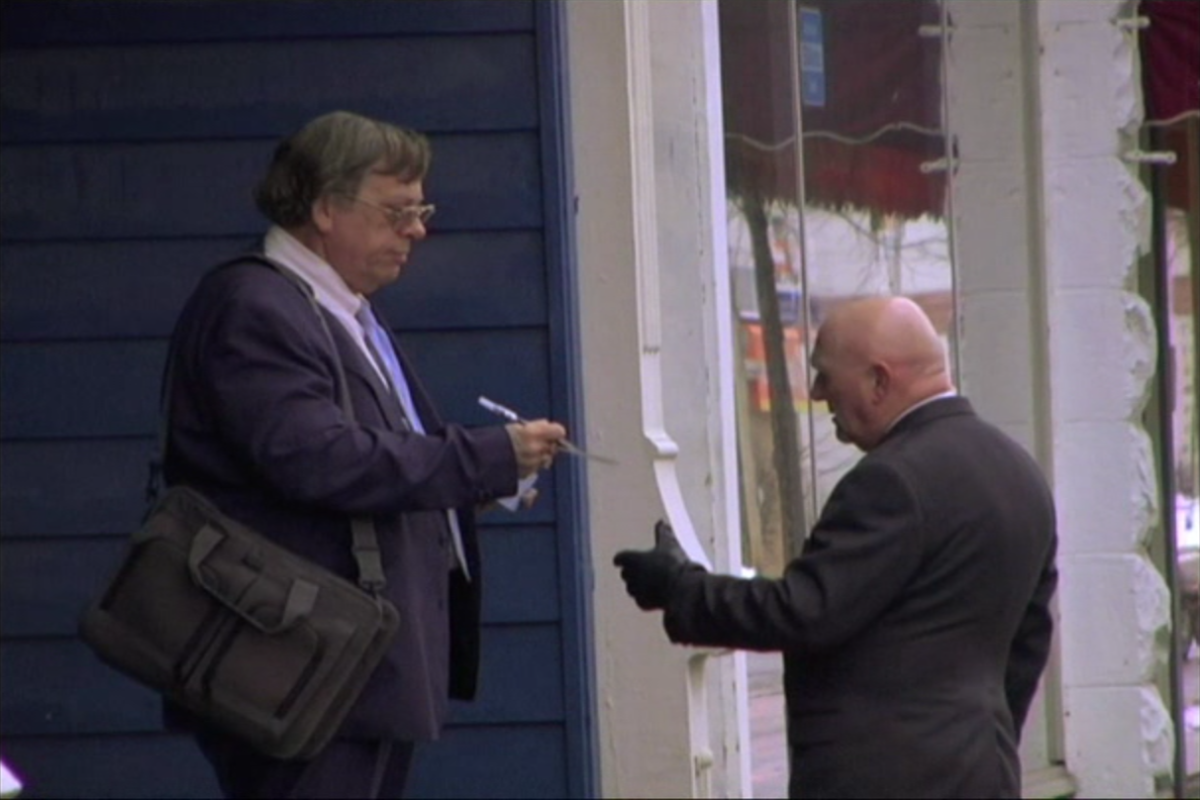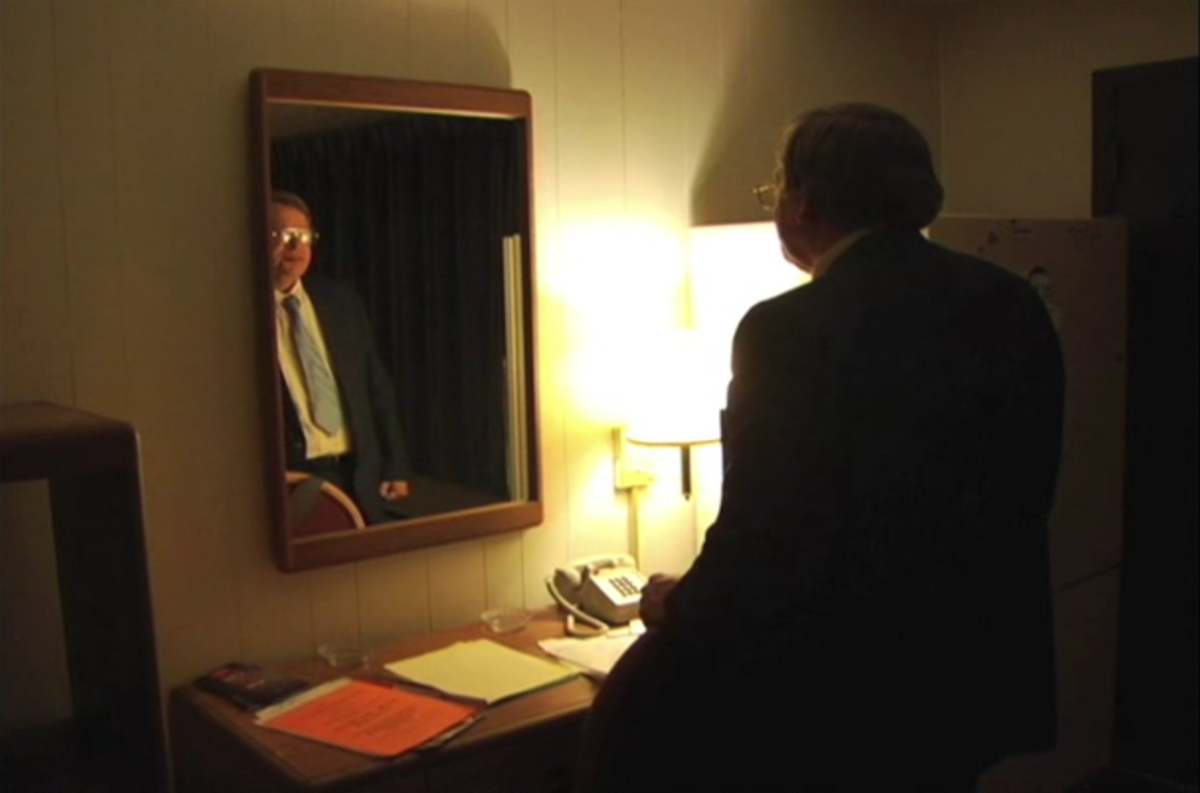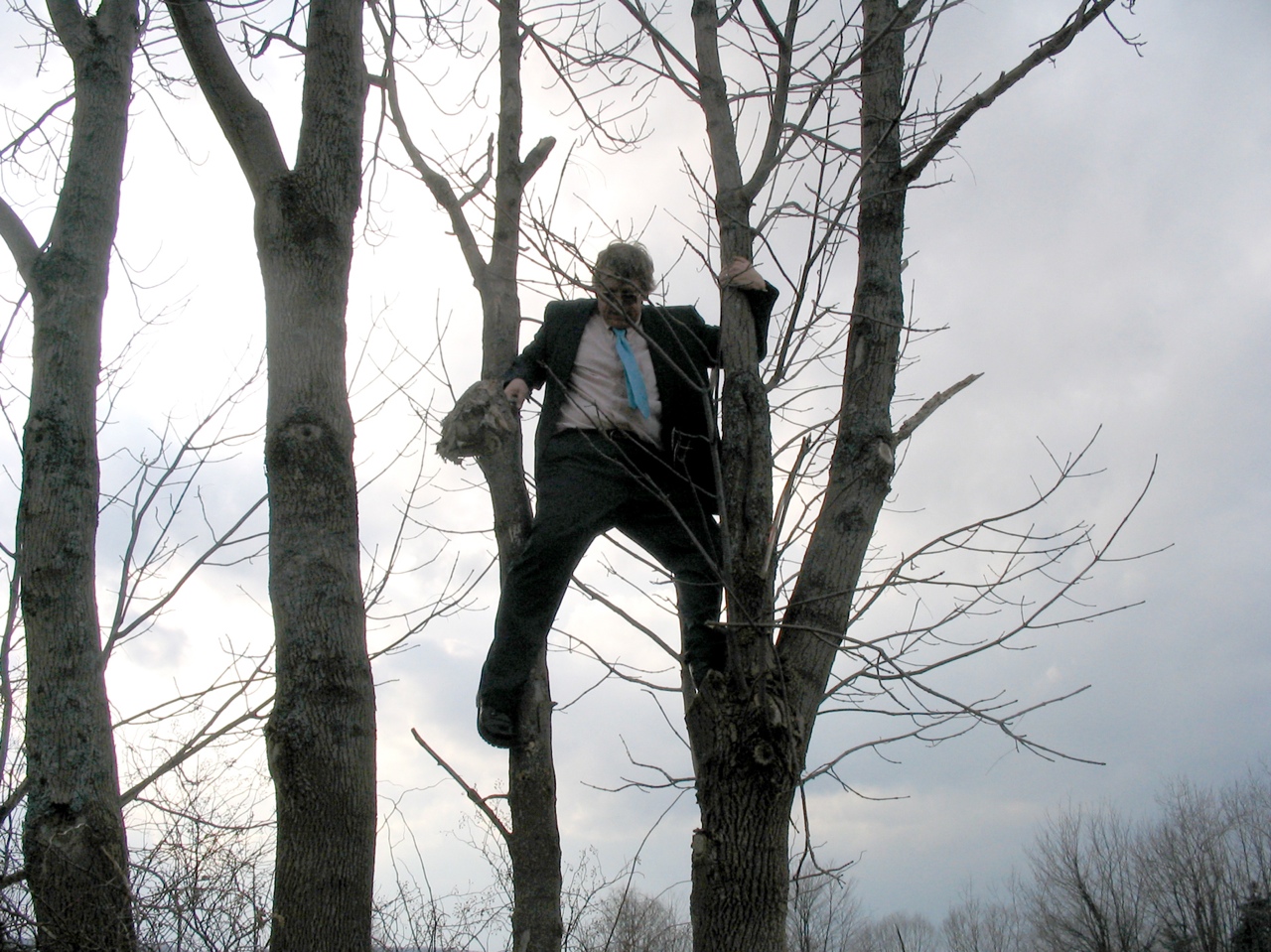The majority of filmmaker Jake Mahaffy’s work is streaming on his Vimeo page, including Wellness, one of the great independent films of the 2000s
The first thing we see in Jake Mahaffy’s Wellness (2008) is a large, older man in a blue suit scaling a dead tree. Set against a bleak winter sky, it is a bizarre sight to behold as he tries to keep his balance among the branches, reaching and struggling to retrieve a greying hornet’s nest with a handsaw. We will soon learn that this is Thomas Lindsey (Jeff Clark), a salesman for the Wellness Corporation — a pyramid scheme that peddles a vaguely defined health care product. We will also learn that Thomas collects these nests as a hobby. He is never more endearing than when speaking about this passion, telling of his fascination with each hive’s intricate design and sharing stories of past adventures in nest hunting. Thomas has only recently taken his job with Wellness, and, from what we can gather, it is an opportunity that he desperately needs. Unfortunately, this opening display of his great efforts among the brittle tree limbs and pervading grayness stand as an apt metaphor for what lies ahead with his new job, for as it will become painfully clear to us, the Wellness Corporation isn’t just a scam, it doesn’t actually exist.
Set in a world of mom-and-pop shops and burnt-carpet motel rooms, Wellness — currently streaming for free on Mahaffy’s Vimeo page — follows Thomas during a three day business trip. He has been sent out on the road to entice investors, make in-person sales calls and put on a Wellness seminar with no experience. Throughout his trip, he interacts with a series of customers and an alleged Wellness supervisor, Paul Stubbs (Paul Mahaffy), who, instead of giving Thomas the training he expected, belittles him and extorts money in exchange for a promotion. By the end of his time on the road, after investing everything he has in the company, Thomas will be reduced to scraping together pocket change to pay for his food and risking his last few dollars on lottery tickets.
Wellness (trailer) – burnbarrelfilms.com from Jake Mahaffy on Vimeo.
Many films featuring pyramid schemes (see 2007’s Great World of Sound for a particularly interesting contrast to Wellness) establish a concrete sense of the crooked business that hires its protagonist. We see the slick men in suits entice their new employees with promises of easy money and give us a reason to believe that these characters could be exploited and corrupted. Wellness keeps its namesake company in a strange, undefined relationship to its central character. We never learn how Thomas found this job, and without even a physical product or service to offer, most of what we discover about Wellness is dreamed up by Thomas along the way. Between his interactions with Paul, a few pamphlets and an unresourceful Wellness office helpline, just enough evidence exists to keep Thomas going. But the film uses this lack of definition to create a situation where a man basically wills a job into existence for a few days while exploring the personal repercussions of putting on such an act.
Thomas’ trip is presented as an endless series of humiliations and rejections. He is an earnest employee, but he lacks the salesman savvy needed to close even the smallest sales. At times, all we can do is laugh as Thomas puts so much effort into trying to do his job — trudging through a muddy field, shouting the benefits of Wellness to an uninterested customer driving a loud excavator, or improvising a pitch over the phone about his product being a faith-based bowel cleanser. (Inspiration for the film came partly from the true story of an ex-preacher who had to take a job as a pyramid scheme salesman, and Mahaffy makes subtle suggestions of a religious past for Thomas.) The spontaneity within such scenes is a result of the atmosphere Mahaffy created on set. The production took place in Pennsylvania without a crew, with very little money, and a cast made primarily of whoever was around and willing to be on camera. This allowed for interactions — many of which were unrehearsed and unscripted — to unfold with their own natural tensions. Certain scenes appear to incorporate interruptions or mistakes, notably during an encounter with a pharmacy manager, in which Thomas completely blanks on his pitch, apologizing as if he forgot a scripted line. In these moments, the film draws us to the performance aspect of being a salesman as Thomas tries his damndest to represent Wellness with authority. Yet Mahaffy is more interested in where the performance breaks down or is disrupted by human error than the coalescence into a professional persona.

Thomas takes his job so deeply to heart that it borders on delusion. With the pressure we sense through calls home to his wife, who we can assume to be ill based on Thomas’ questions each time they talk, it is clear that he has a lot riding on this position. This leaves him very susceptible to even the most obvious deceptions. This is never more clear than in his interactions with Paul. One of the film’s most striking aspects is how it strips away the slickness so often associated with the scammers in these types of films. Paul isn’t the smooth-talking Wolf of Wall Street hot shot we expect, but an agitated bruiser who looks more likely to pummel his customers and steal their cash than win them over with a pitch. He lectures Thomas about the “silent messages” he sends to people, traits that could turn them off from buying. But the message Paul himself sends is one of violence. He stalks into their first sales call wearing black gloves like a hitman; he leaves chasing the client down the sidewalk, yelling obscenities at him after being rejected. Paul’s discussions with Thomas undergo manic flips between cruel disengagement with his “employee” and feigned interest in helping him succeed, the latter only after Thomas writes him a check to prove his devotion to the company.
Thomas’ scenes with Paul build a contrast of extremes within each sales call. Despite his awkwardness and lack of success, Thomas tries to win customers by interacting with them. He takes his time and listens to their stories to relate on a personal level. But when Paul is present, Thomas is often forced to act as mediator, calming his boss as he rants of any non-interested customers being a waste of time to their faces. Paul nakedly embodies the “time is money” ethos in its most repulsive form. Similarly, personality is only worthwhile to Paul if it can be used to sell something. After he tells Thomas to use his hornet’s nest hobby as the centerpiece of his sales pitch, Mahaffy includes a scene of Thomas practicing in front of his motel mirror. He times himself on his watch and fumbles through the story he told so effortlessly before. His attempts at conveying spontaneity come across strained and unnatural; his personality doesn’t translate into something so calculated.
Ultimately, Mahaffy sees it as a sign of grace that Thomas mostly fails at selling for Wellness. Yet while most of Thomas’ sales calls end in rejection, the film features rare instances of people actually buying into Wellness. Some of these customers act as subtle reflections upon Thomas and his own investment in the company. One client cites his reason for investing as “thinking positive,” a sentiment akin to the faith Thomas pushes in his pitches and the chances he takes on lottery tickets. Another man functions as a near mirror-image of Thomas, even being dressed in a similar suit and tie when Thomas arrives at his home with a Wellness contract. The man nods along to the inept pitch like the eager customer counterpart to Thomas’ devoted salesman. He shows blind ambition in the idea of becoming an early investor in the company before his wife steps in and talks him out of a $2,000 payment. On his way out the door, Thomas fails to put the pressure on, making a defeated final push to seal the deal, while he himself — who has “invested everything” in the company — is left penniless and crying over a cheap diner breakfast just a few scenes later. We don’t get a sense in these scenes that Thomas knows he is scamming these people, and this gap in his understanding is precisely what makes the film so much more provocative than other stories of pyramid schemes. It becomes less about a man growing aware of the moral consequences of the scam he is pushing and more about the danger of having to invest one’s spirit in non-spiritual pursuits. Thomas’ lack of awareness due to his “need to succeed” shows him unwittingly perpetuating a system where virtues of trust and good faith become targets. We see how an honest person can get stuck peddling this dishonesty, not only to his potential customers, but to himself.

Andrew Bujalski recently observed that, much like Thomas and his lack of sales prowess being a virtue, Mahaffy’s own disinterest in promoting his work is a similar sign of integrity. While a downside of this is that his work has remained mostly unknown, the filmmaker’s humanity is on display in his films, too. Wellness demonstrates a great appreciation for all the humble, empathetic gestures from strangers and little personalizing eccentricities (notice the attention Mahaffy gives to a Santa magnet on Thomas’ motel fridge or the way he allows a collection of trinkets, photos, and knick knacks on a secretary’s desk to take up so much of the frame during one of the film’s lowest points) that punctuate Thomas’ despairing pursuits. These small displays of kindness and sparks of personality keep the film from succumbing to easy cynicism. Another beautiful moment in a copy shop allows a brief glimpse of hope just before the climactic seminar. When Thomas goes to make promotional materials for his big day, we see him designing his paper signs with a female employee. Throughout the scene, he walks around the store with great enthusiasm, like an artist with every tool at his disposal. His excitement infects the clerk as she helps him pick out the colors and layouts for his corny (and unknowingly sloganeering) banners — “PARADIGM SHIFT!!!,” “BELIEVE IN WELLNESS!!!,” “THIS IS IT!!!!” It is a truly collaborative and constructive exchange, an instance of business being done on a personal and interactional level that is as far away from Paul’s “get the money” mentality as can be. It’s almost beautiful when Thomas’ credit card doesn’t go through at the end of the scene.
Wellness ends with Thomas staring out of a bus window on his ride out of town. Mahaffy holds in a close-up of his face while lost in thought. Earlier, we were kept at a distance when Thomas had his tearful breakdown in the diner. But now Mahaffy draws us in tight, allowing Thomas’ stillness and silence to speak louder than any outward display of shame or dejection. And as Thomas rides off, his suitcase and hornet’s nests in tow, Wellness traces with unwavering attention the fine line business rides between fueling and destroying the American imagination.

Also available on Mahaffy’s Vimeo page are his feature debut, War (2004), and a collection of his short films, including A.D. 1363, The End of Chivalry (2015). His 2015 feature Free in Deed is available for streaming on Tubi and Amazon Prime.
Follow Brett on Twitter and Letterboxd
(Split Tooth may earn a commission from purchases made through affiliate links on our site.)




